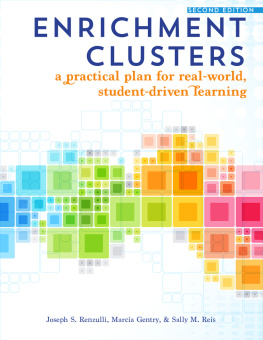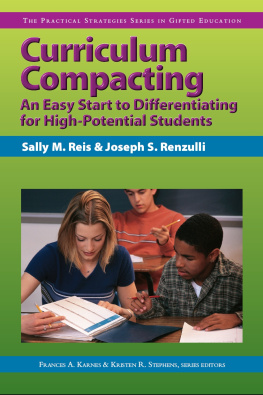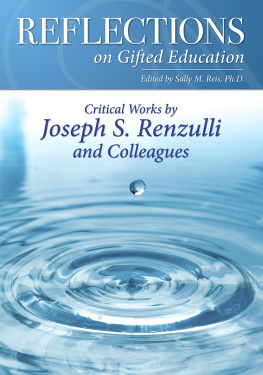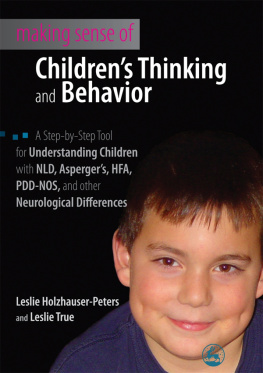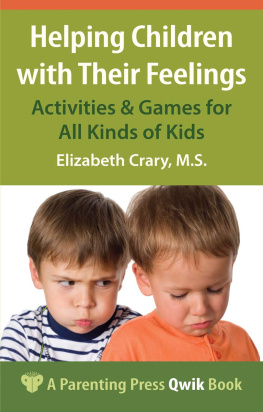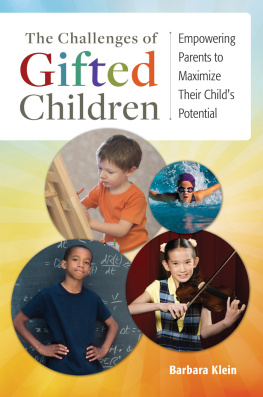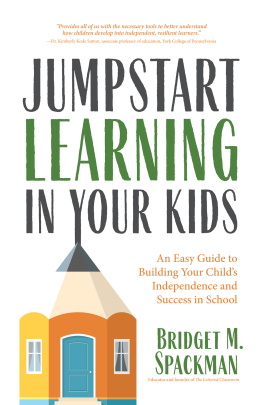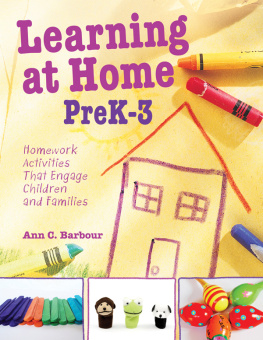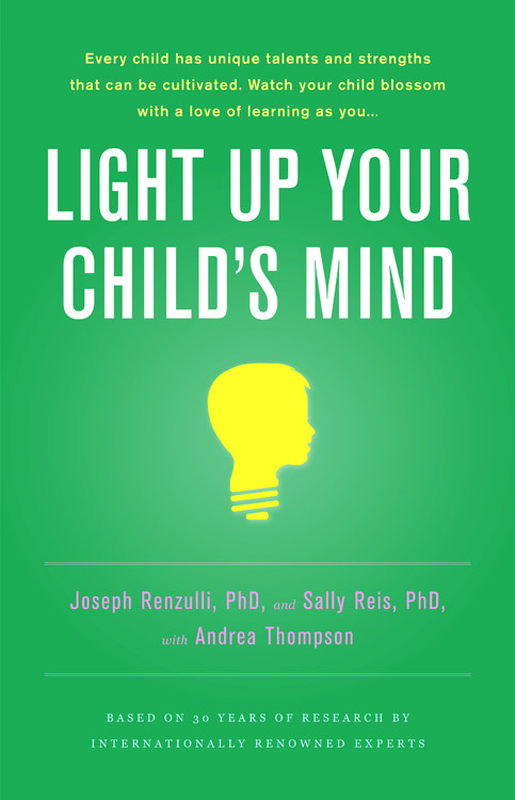Copyright 2009 by Joseph S. Renzulli, MD, PhD, and Sally M. Reis, MD, PhD
All rights reserved. Except as permitted under the U.S. Copyright Act of 1976, no part of this publication may be reproduced, distributed, or transmitted in any form or by any means, or stored in a database or retrieval system, without the prior written permission of the publisher.
Little, Brown and Company
Hachette Book Group
237 Park Avenue, New York, NY 10017
Visit our website at www.HachetteBookGroup.com
www.twitter.com/littlebrown
First eBook Edition: August 2009
Little, Brown and Company is a division of Hachette Book Group, Inc. The Little, Brown name and logo are trademarks of Hachette Book Group, Inc.
ISBN: 978-0-316-05314-3
To our children, Liza, Sara, Scott, and Mark,
who taught us to parent with love and humor.
We hope they will always follow their dreams.

The mind is not a vessel to be filled but a fire to be kindled.
PLUTARCH
The twenty-first century is in many respects an astonishing time to be a child growing up and just beginning to understand life, and an equally astonishing time to be the parent of that young boy or girl. Soon enough, he will be moving into arenas specifically, higher education and careers that have been reshaped by profound changes that occurred in a generation or less. One American business leader says that the work world now urgently demands particular talents: lateral thinking, courage, and an ability to see things, not the way they were but how they might be.
Consequently, never has there been a more pressing need for dynamic approaches and informed, sensitive attention to what children must acquire during their twelve or so initial years of getting educated if they are to meet the challenges ahead.
When you envision your childs future and what you want for him, perhaps words such as happiness, health, and success come to mind. When you consider how such desirable, understandable goals might be reached that is, what your child needs in the way of informed, sensitive attention you probably find yourself caught up in the stressful concerns of the here and now. You think about grades, test scores, how tough it is to be accepted into a top college, and what constitutes a useful area of study that will lead to a rewarding career.
In Light Up Your Childs Mind, we urge a different kind of focus, one that describes the path from a childs early school years to that happy, healthy, successful future as having less to do with good grades and the right colleges and useful subjects, and more to do with early experiences in creative thinking and productivity.
Albert Einstein wrote, It is in fact nothing short of a miracle that the modern methods of instruction have not yet entirely strangled the holy curiosity of inquiry; for this delicate little plant, aside from stimulation, stands mainly in need of freedom. (About himself, Einstein insisted, I have no special talents. I am only passionately curious.) Our work originates from the National Research Center on the Gifted and Talented. But our work and this book is not about the gifted child, in the currently popular sense of the term. Your child, whether or not he has been officially labeled as gifted, has strengths and interests and a holy curiosity about the world that must be stimulated and allowed the freedom to grow.
In the chapters that follow, we describe dozens of ideas that encourage an investigative, or inquiry-oriented, approach to learning, rather than the one-size-fits-all, drill-and-practice approach that is common in most classrooms. These are workable ideas that you can use in the home to support your childs unique strengths and interests, or enthusiasms. Many of our strategies in the central how-to chapters in Part Two are highlighted in boxes for example, conversations to have with your child, projects to help get started, suggestions on how to offer gentle guidance, and tips on how to recognize your childs preferred style of expression.
None of this is hard or tricky or hugely time-consuming. Our enrichment and talent-development tools are accessible and inviting to any typically time-pressured, stressed-out mom or dad. We believe that, more than ever, it is essential for involved parents to have these strategies at their fingertips. They are instrumental in helping children understand and develop empowering aspects about themselves that frequently are not taken into account in most school learning experiences. They nourish the delicate little plant that is your childs bright and curious mind.
Given such opportunities and self-discovery experiences, heres what can happen for your child:
She realizes that learning is actually a lot of fun and incredibly exciting.
Her self-confidence grows; she perceives herself as a potentially creative person with genuine talents.
She acquires real problem-solving skills that are transferable to a variety of endeavors, in the present and in the future, rather than a mind simply filled with facts.
She gains insights that can lead to smart choices about everything from extracurricular activities to college majors to career options.
She may start doing a lot better in school a huge added bonus.
And for you, the parent, there will be fewer worries over homework and grades and more joy and delight in watching your child blossom in ways uniquely his own. Of course, many factors influence what a youngster will become, but surely the uncontested role of parenting is key in guiding your child on a happy, healthy, successful path.
___________
What Is This Thing
Called Giftedness?


Looking for Gifts Outside the Box
S chool really ought to be an enjoyable place, a place your youngster looks forward to every day. More than that, or as part and parcel of it, school should help to prepare your child to live effectively in a complex world. The psychologist Jean Piaget once defined the principal goal of education as creating men and women who are capable of doing new things, not simply repeating what other generations have done. To become capable of doing new things, your child must acquire skills that go beyond reading, writing, and arithmetic during his critical formative years. They include an ability to:
analyze and select from various sources of information;
approach the unpredictable with confidence;
take appropriate chances safe risks in uncharted waters;
confront, clarify, and act on situations imaginatively and constructively;
apply the worlds knowledge today instantly accessible by logging on to the Internet in ways that promote critical thinking, infectious enthusiasm, self-motivation, and genuine problem solving; and
cooperate with others while remaining true to an emerging personal system of attitudes, beliefs, and values.
Is what goes on in your childs classroom offering him sufficient opportunity to develop such skills? Maybe yes, maybe no. We would go so far as to guess, unfortunately, probably not. But a parent can provide opportunities that a school does not.
Without knowing your youngster personally, we will state with confidence some qualities he possesses:


